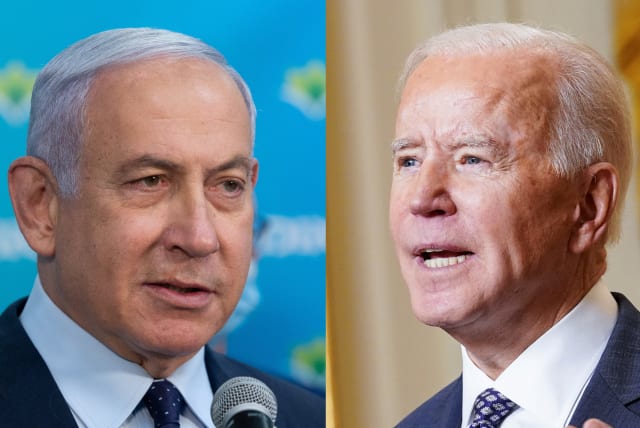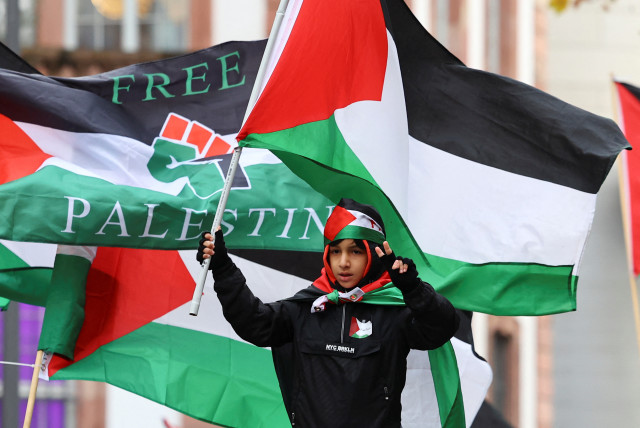Biden: Bibi to back 2-states. Netanyahu: No I won’t

Biden said Netanyahu was not opposed to all two-state solutions, and there were a number of types possible, noting that some United Nations members do not have military forces.
Prime Minister Benjamin Netanyahu rejected US President Joe Biden’s assertions that he would eventually back Palestinian statehood, as the two leaders fought publicly over the issue in the aftermath of their first conversation in weeks.
“I will not compromise on full Israeli security control over all the territory west of [the] Jordan [River] – and this runs contrary to a Palestinian state,” Prime Minister Benjamin Netanyahu wrote in a post on X, formerly Twitter, on Saturday night.
It was the third time he had spoken about the issue in the last 48 hours.
Earlier in the day, the Prime Minister’s Office clarified that in Netanyahu’s conversation with Biden, he “reiterated the position he has consistently held for years.”
“After Hamas is eliminated, Israel must retain full security control of the Gaza Strip to ensure that Gaza won’t pose a threat to Israel, and this conflicts with the demand for Palestinian sovereignty,” the PMO stated.
It noted that Netanyahu had expressed this same opinion when he spoke with reporters in Tel Aviv on Thursday night.
During that press conference, the prime minister stated, “Those who speak of the day after Netanyahu are talking about the creation of a Palestinian state led by the Palestinian Authority.”
His words came amid a push by the Biden administration to revive a two-state resolution to the Israeli-Palestinian conflict by linking it to a Saudi normalization deal and the rehabilitation of Gaza.
At a conference of US mayors in Washington on Friday, Biden told reporters he believed that Netanyahu would support Palestinian statehood, particularly if that state was a demilitarized one, but he did not provide many details on the matter.
“I think we will be able to work something out,” Biden told reporters when quizzed about Netanyahu’s opposition to Palestinian statehood.
“No, he didn’t say that,” Biden said.
Different solutions
He explained that “there are a number of types of two-state solutions.” He noted that “there are a number of countries that are members of the UN that still do not have their own military.”
Biden added, “So I think there are ways in which this could work.”
In the readout of the Friday call between Biden and Netanyahu, the White House said, “The president also discussed his vision for a more durable peace and security for Israel fully integrated within the region and a two-state solution with Israel’s security guaranteed.”
The dispute is one of several growing tension points between the two men as the Gaza war is in its fourth month, and both leaders are engaged in political battles to retain their posts.
US National Security Council spokesman John Kirby told reporters that Biden “still believes in the promise and the possibility of a two-state solution. He recognizes that’s going to take a lot of hard work. It’s going to take a lot of leadership there in the region, particularly on both sides of the issue
“And the United States stands firmly committed to – to eventually seeing that outcome,” Kirby stated.
“The president is under no illusions of how elusive a two-state solution is,” Kirby said, adding that he is “not Pollyannaish about this.”
Kirby recalled that before Hamas’s October 7 attack against Israel, the US was working with Israel and Saudi Arabia on a normalization deal, one of which Biden believes Hamas was aware. This could have contributed to the timing of Hamas’s attack, he added.
Discussions on that normalization deal are ongoing, he stressed. “We’ve gotten some positive feedback, even from Saudi Arabia, about what that could look like going forward,” Kirby explained.
If normalization is achieved, “that could be a significant milestone in overcoming some of the challenges of a two-state solution,” Kirby said.
He attempted to downplay the tensions between Biden and Netanyahu. The two men have known each other for over 40 years but often disagree with each other.
The US and Israel are “not going to agree on everything,” Kirby said. “This isn’t about, you know, trying to twist – twist somebody’s arm or – or force a change in their thinking.”
According to Biden, “The best long-term solution for regional security, particularly the security of the Israeli people, is a free and independent Palestinian state that they can live in – in peace and security with – and this is an important caveat – with Israel’s security also guaranteed. He still believes in that, and we’re going to continue to talk to our Israeli counterparts,” Kirby said.
He also urged reporters not to overanalyze the frequency of the calls. “I have no doubt that there will be additional calls going forward, clearly.
Kirby noted that US Secretary of State Antony Blinken has visited the region multiple times since October 7 and is likely to return.
During Biden’s conversation with Netanyahu, the two men also discussed the IDF’s transition to a lower-intensity military campaign in Gaza that would rely more heavily on targeted operations.
The White House said that this transition would “enable the flow of increasing amounts of humanitarian assistance while keeping the military pressure on Hamas and its leaders.”
“The president also discussed Israel’s responsibility even as it maintains military pressure on Hamas and its leaders to reduce civilian harm and to protect the innocent,” the White House said.
Biden welcomed Israel’s decision to allow a shipment of flour to head to Gaza “directly through Ashdod port while our teams separately work on options for more direct maritime delivery of assistance into Gaza,” the White House stated.
The two men also “discussed the recent progress in ensuring the Palestinian Authority’s revenues are available to pay salaries, including for the Palestinian Security Forces in the West Bank.”
Netanyahu and Biden also spoke about efforts to release the remaining 132 hostages in Gaza. The US has been one of Israel’s main allies in that effort, with the Biden administration working through two mediating countries, Egypt and Qatar.
Kirby told reporters that National Security Advisor Jake Sullivan had met with relatives of some of the hostages on Thursday, and that explains that US special envoy Brett McGurk had been in Doha two weeks ago.
Efforts to free the hostages are “ongoing” and “serious,” Kirby said, but he cautioned against expecting an “imminent” announcement.
The US, he said, doesn’t “have a lot of tactile information about where they are or what specific condition they’re being held.”
Hannah Sarisohn contributed to this report.
Jerusalem Post Store
`; document.getElementById("linkPremium").innerHTML = cont; var divWithLink = document.getElementById("premium-link"); if (divWithLink !== null && divWithLink !== 'undefined') { divWithLink.style.border = "solid 1px #cb0f3e"; divWithLink.style.textAlign = "center"; divWithLink.style.marginBottom = "15px"; divWithLink.style.marginTop = "15px"; divWithLink.style.width = "100%"; divWithLink.style.backgroundColor = "#122952"; divWithLink.style.color = "#ffffff"; divWithLink.style.lineHeight = "1.5"; } } (function (v, i) { });

